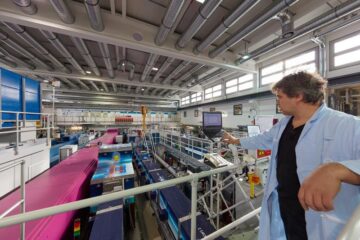Small Molecule XIAP Inhibitor

<b>Challenge</b><br>
Apoptosis is a highly conserved process regulating the balance between cell death and proliferation for the maintenance of tissue homeostasis. Insufficient apoptosis can lead to the development and progression of cancer. Most chemotherapeutic drugs kill cancer cells by inducing apoptosis. Importantly, tumour cells which are capable of evading programmed cell death often become chemoresistant. Inhibitor of apoptosis proteins (IAPs) are a group of antiapoptotic proteins that inhibit caspases, central players in the apoptotic cascade. XIAP, the most potent and well characterized member of the IAP family is an inhibitor of caspase-3, -7 and -9. Many human malignancies express elevated XIAP-levels thus leading to apoptosis resistance. Therefore, targeting XIAP is a promising strategy to overcome apoptosis resistance. In this context, small molecule XIAP inhibitors are attractive antitumor drug candidates. <hr> <b>Technology</b><br> Through virtual screening of commercially available databases several compounds were identified as novel XIAP inhibitors. These compounds, which showed no cytotoxicity on their own, were tested in a human leukaemia cell line stably overexpressing XIAP for their ability to overcome the cells’ chemoresistance. The most effective molecules increased apoptosis-induction through the chemotherapeutic drug etoposide from approximately 10% to above 60% apoptotic cells. In order to develop the full therapeutic potential of our XIAP inhibitors, we currently work on the underlying apoptosis signalling mechanisms, NMR binding studies, and towards an in vivo proof of principle.
Weitere Informationen: PDF
Bayerische Patentallianz GmbH
Tel.: +49 (0)89-5480 177-10
Ansprechpartner
Peer Biskup
Media Contact
Alle Nachrichten aus der Kategorie: Technologieangebote
Neueste Beiträge

Bakterien für klimaneutrale Chemikalien der Zukunft
Forschende an der ETH Zürich haben Bakterien im Labor so herangezüchtet, dass sie Methanol effizient verwerten können. Jetzt lässt sich der Stoffwechsel dieser Bakterien anzapfen, um wertvolle Produkte herzustellen, die…

Batterien: Heute die Materialien von morgen modellieren
Welche Faktoren bestimmen, wie schnell sich eine Batterie laden lässt? Dieser und weiteren Fragen gehen Forschende am Karlsruher Institut für Technologie (KIT) mit computergestützten Simulationen nach. Mikrostrukturmodelle tragen dazu bei,…

Porosität von Sedimentgestein mit Neutronen untersucht
Forschung am FRM II zu geologischen Lagerstätten. Dauerhafte unterirdische Lagerung von CO2 Poren so klein wie Bakterien Porenmessung mit Neutronen auf den Nanometer genau Ob Sedimentgesteine fossile Kohlenwasserstoffe speichern können…

















